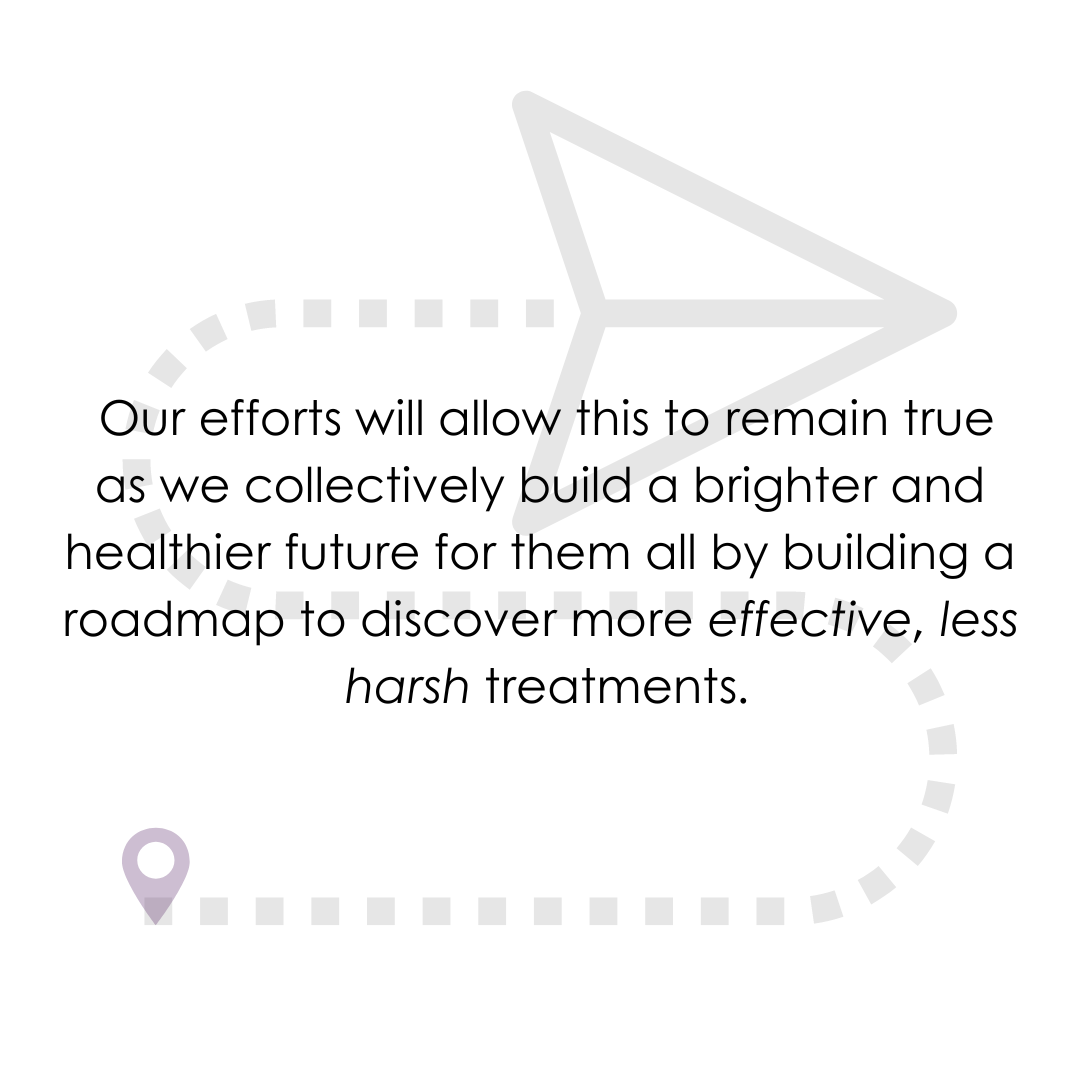Elevate Wilms
Multi-Stakeholder Engagement for Wilms tumor that puts Children in the Center
“Organizing ideas for presentation is one of the best ways to learn. What we learn we can teach. I learned a new concept through working on the poster—design thinking. And learning about this subject was the beginning of teaching it in our role as advocates, a self-reinforcing positive loop.”
– Miriam Weiss, MD & Elevate Wilms workgroup member
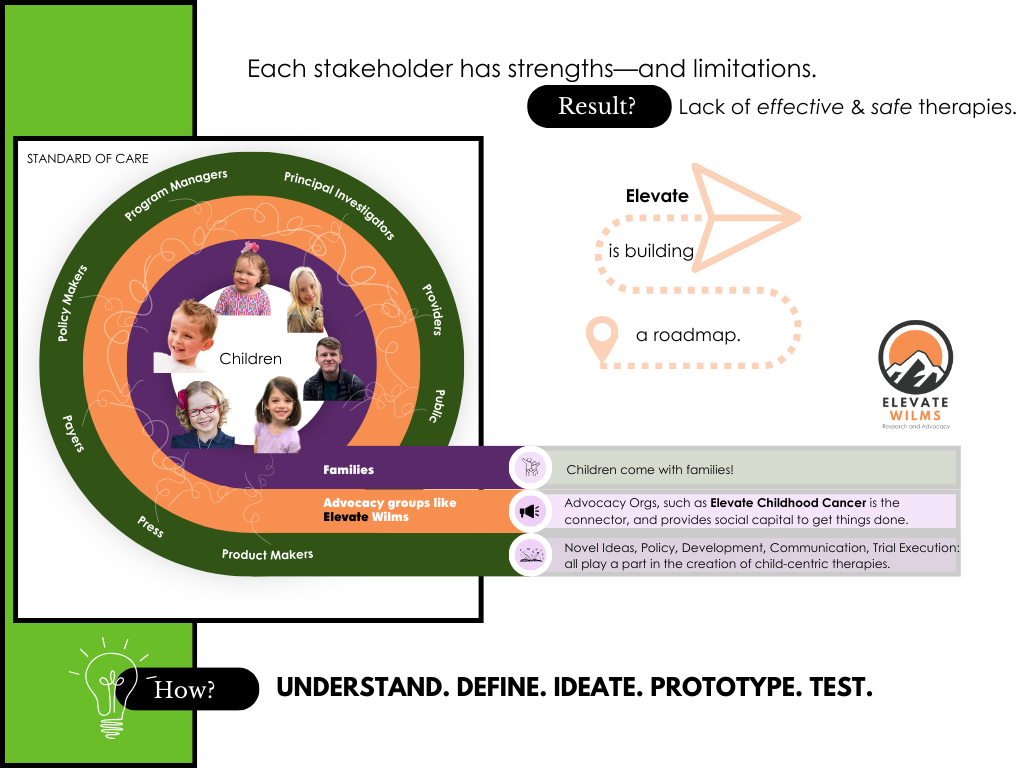
Dozens of databases
+ Thousands of articles
+ Hundreds of hours of Elevate Wilms workgroup effort
=
The Creation of a Proposed Roadmap
for Multi-Stakeholder Engagement for Wilms tumor
———————–
In the spring, members of the Elevate Wilms workgroup set a goal to examine the existing models of multi-stakeholder engagement in order to create a roadmap to improve outcomes for those diagnosed with Wilms tumor. The idea was sparked when members of the workgroup were invited to attend the 12th International Pediatric Renal Tumor Biology Meeting at Memorial Sloan Kettering, and Miriam Weiss, one of Elevate’s hard working workgroup members noticed a “call for scientific posters.” The group settled on a goal to submit a scientific poster to present to attendees at the event hoping it would ignite conversations around topics of importance to the group!
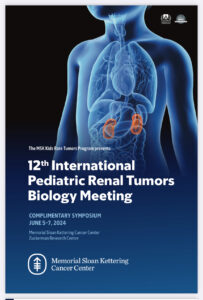
Making needed advancements for children diagnosed with Wilms tumor can mean a lot of different things. In some cases, it means updating protocols to include genetic testing at the time of diagnosis so that families can plan better, and children might have the chance for earlier diagnostic screening. In other cases, it could mean making existing drugs available to children with Wilms tumor when there is a common molecular target; this is sometimes referred to as drug repurposing. Another possible advancement could be the development of brand new compounds specifically for Wilms tumor!
Regardless, all of these efforts require multiple stakeholders!
Elevate Childhood Cancer Research and Advocacy stands in the center of the myriad of stakeholders involved in changing the future for kids diagnosed with cancer, serving as the glue or the connector between and among them. So, the Elevate Wilms workgroup set out to apply a scientific approach to better understanding the ins and outs of getting this done well! The first step was to identify appropriate databases to search for keywords related to other groups and organizations that have attempted to bring out positive change for childhood cancer or a pediatric rare disease through multi-stakeholder engagement.
Members of the team sifted through thousands of articles before settling on 35 that were ultimately included in the study.
What did the team learn?
First, patient advocacy groups (PAGs) have been an important, and sometimes critical, stakeholder to expedite needed advancements, such as changes to protocol, drug repurposing, and the development of new therapies, particularly for rare diseases. Second, the team was able to demonstrate that there are between 8-10 unique stakeholders that need to be included in efforts to bring about these needed changes, including: product makers (e.g. pharmaceutical companies, medical device makers), policy makers (e.g. legislators, FDA/EMA), principal Investigators (scientists), providers (e.g. surgeons, nurses, oncologists), program managers (e.g. cancer consortiums), payers (e.g. insurance, Medicaid, investors), press (e.g. newspapers, TV news), and the public (Petkovic et al., 2020).
Most stakeholders would agree that keeping children at the center of decisions regarding children’s cancer makes sense.
Unfortunately, it’s easy for the demands placed on each stakeholder to pull children out of the center of decision-making processes. The team dug further into the literature to learn as much as possible about successful models and important considerations to include in any new model.
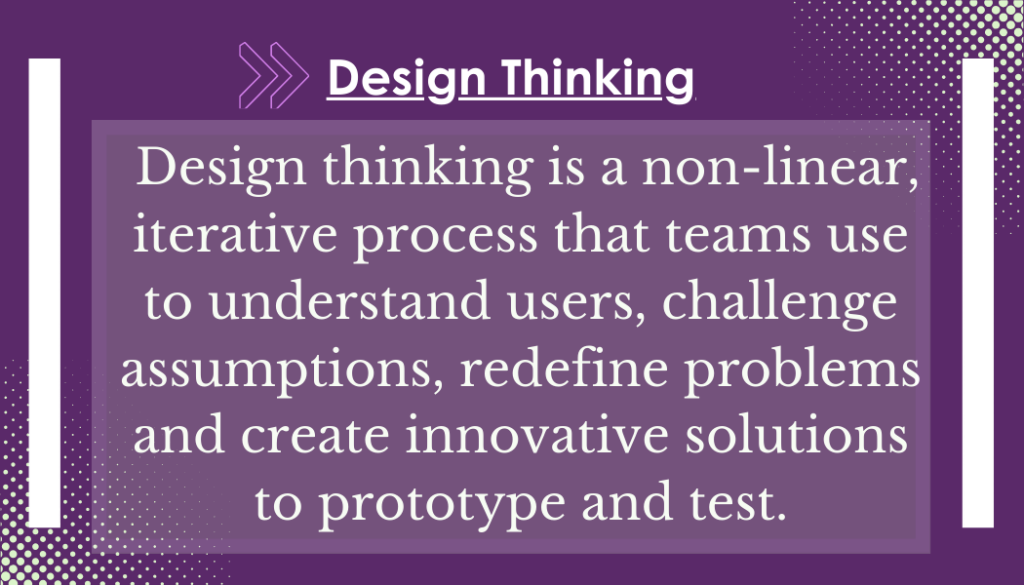 The Elevate Wilms workgroup then proposed a model grounded in Design Thinking, thanks to the guidance and background of Robyn Spoon, Elevate Founder and CEO, to help bridge common gaps between stakeholders, develop common language and processes and to bring about equitable engagement from all stakeholders intended to make sure that kids are firmly planted in the center of all engagement! Some have worked hard to include a range of stakeholders to create much-needed solutions for kids with cancer. The Elevate Wilms workgroup took those efforts a step further by proposing a model for engagement: the use of Design Thinking [HERE] to approach common problems AND the inclusion of a measure of authentic engagement.
The Elevate Wilms workgroup then proposed a model grounded in Design Thinking, thanks to the guidance and background of Robyn Spoon, Elevate Founder and CEO, to help bridge common gaps between stakeholders, develop common language and processes and to bring about equitable engagement from all stakeholders intended to make sure that kids are firmly planted in the center of all engagement! Some have worked hard to include a range of stakeholders to create much-needed solutions for kids with cancer. The Elevate Wilms workgroup took those efforts a step further by proposing a model for engagement: the use of Design Thinking [HERE] to approach common problems AND the inclusion of a measure of authentic engagement.
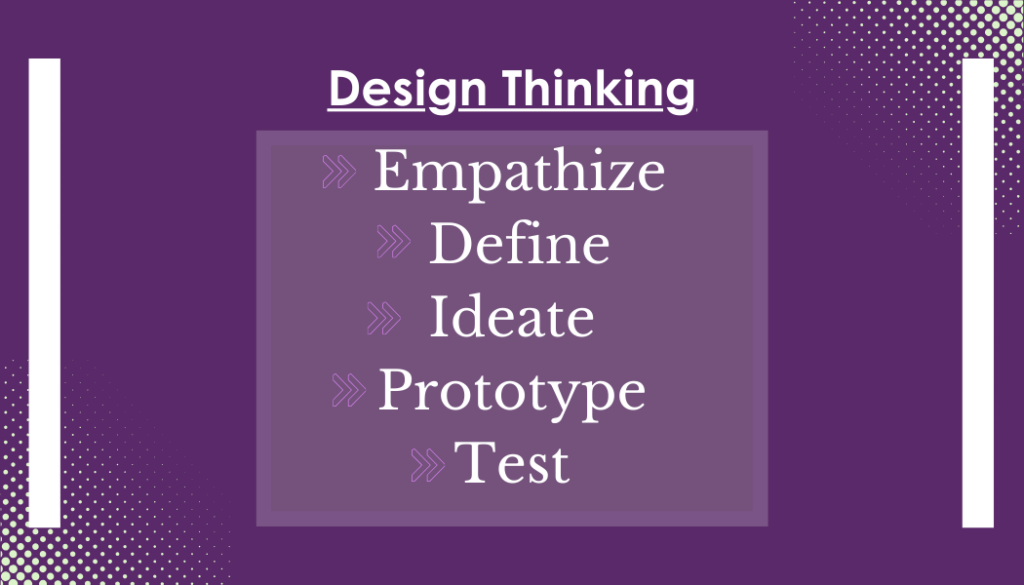

During the Pediatric Renal Tumor Biology Meeting, Elevate Wilms workgroup members in attendance spent three full days “empathizing” with scientists, gaining the most up-to-date information regarding genetics, genomics, standard of care, drug trials, developmental biology and more. During that same time period, they developed deeper connections and relationships with three key stakeholders: principal investigators, providers, and policy makers (FDA). The workgroup members developed more questions and also began to define some of the most critical areas of need in order to bring about change for Wilms tumor, and other pediatric renal tumors.
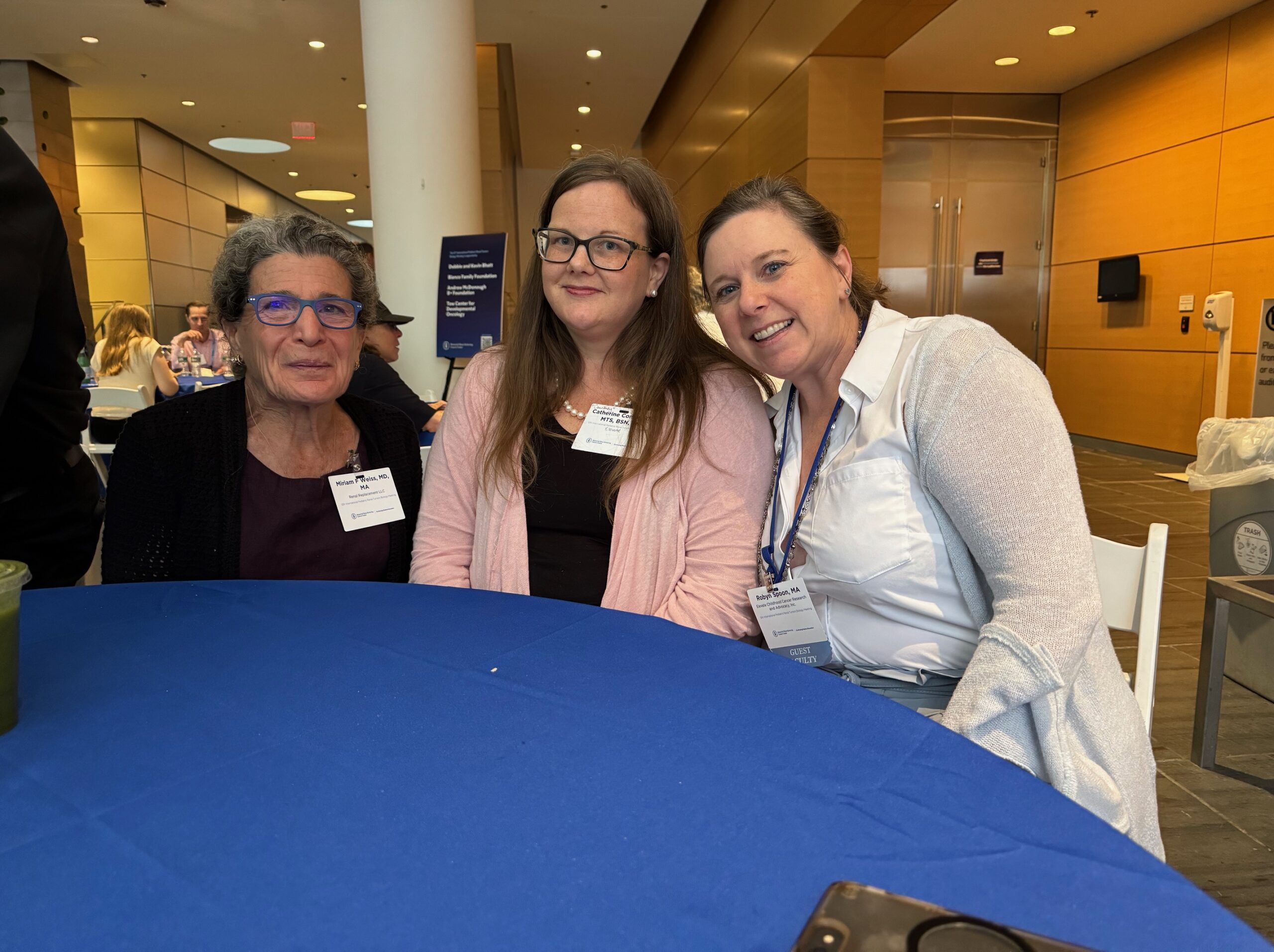
What’s next?
After returning from New York, the entire Elevate Wilms workgroup met to review the findings from the symposium.
The next goal is for the Elevate Wilms workgroup to define and prioritize the challenges they feel are most important to tackle. The feedback from the Elevate Wilms workgroup will be critical in determining next steps.
The Poster
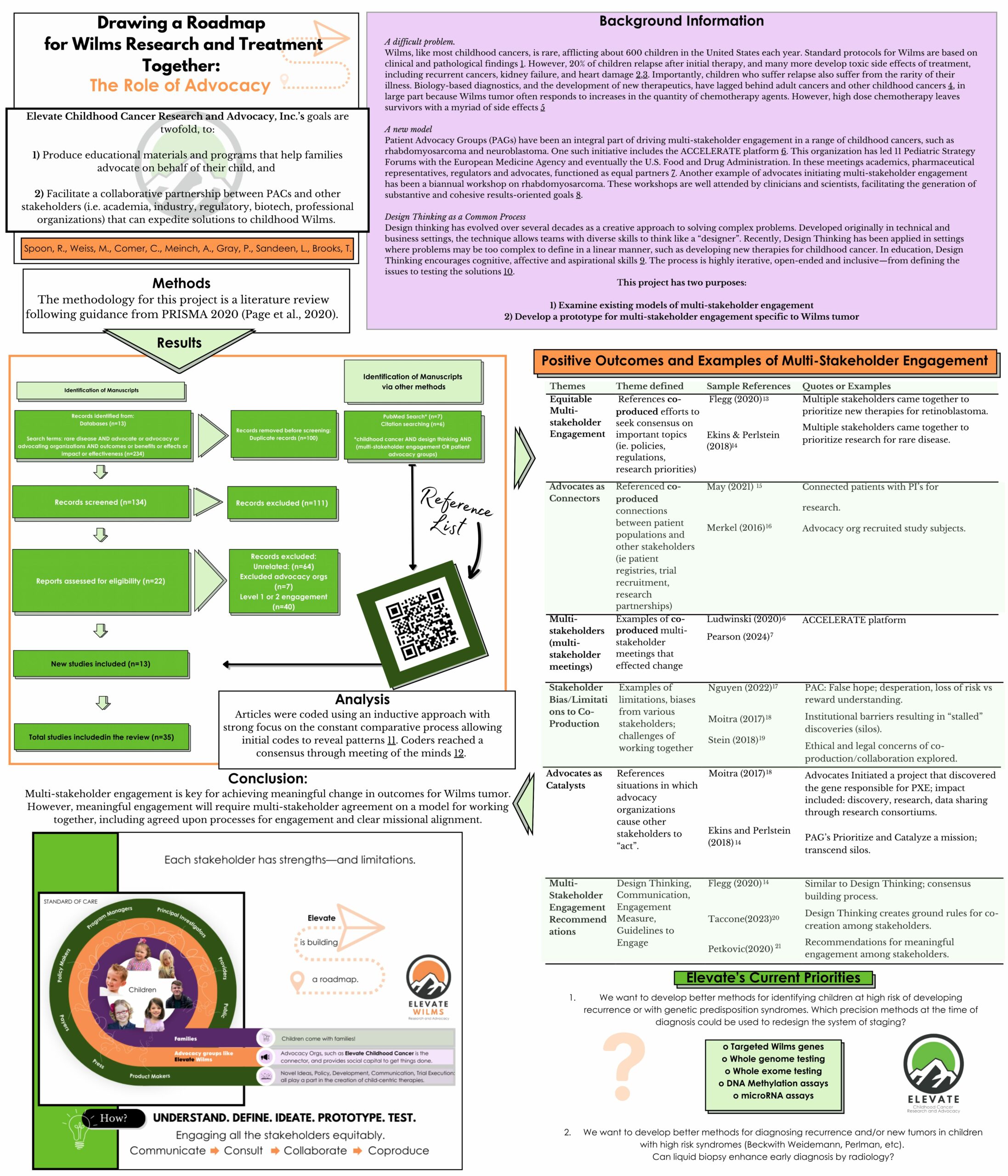
To gain a complete overview of the event, check out this brochure from the conference: PedsRenal2024_Brochure

Explore the Elevate Wilms workgroup
What are we doing?
“Elevate workgroups are the core of Elevate Childhood Cancer Research and Advocacy, Inc.” – Chris Osborne, Elevate Board Chair
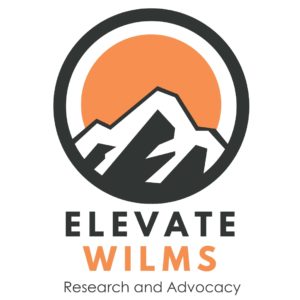
Elevate Wilms is a part of the advocacy committee within Elevate Childhood Cancer Research and Advocacy with two main priorities:
1. Create useful educational materials and programs to help
families better advocate within the medical system on behalf of their child
AND
2. Enable patient/advocates and caregivers (PACs) to instigate improvements
in therapy development for children diagnosed with cancer
Elevate is reimagining treatment for those diagnosed with childhood cancer, like Wilms tumor and we need your help. Our efforts will collectively build a brighter and healthier future for our children by building a roadmap to discover more effective, less harsh treatments.
Join Elevate
Your support makes a difference. We can do a lot, but we can move much faster with your invaluable help! Fundraisers, donations, volunteering your time and talents, it all adds up. Join Elevate as we dramatically improve the lives of those diagnosed with childhood cancer; from diagnosis, through treatment, on to survivorship, and in some cases, the end of a child’s life.
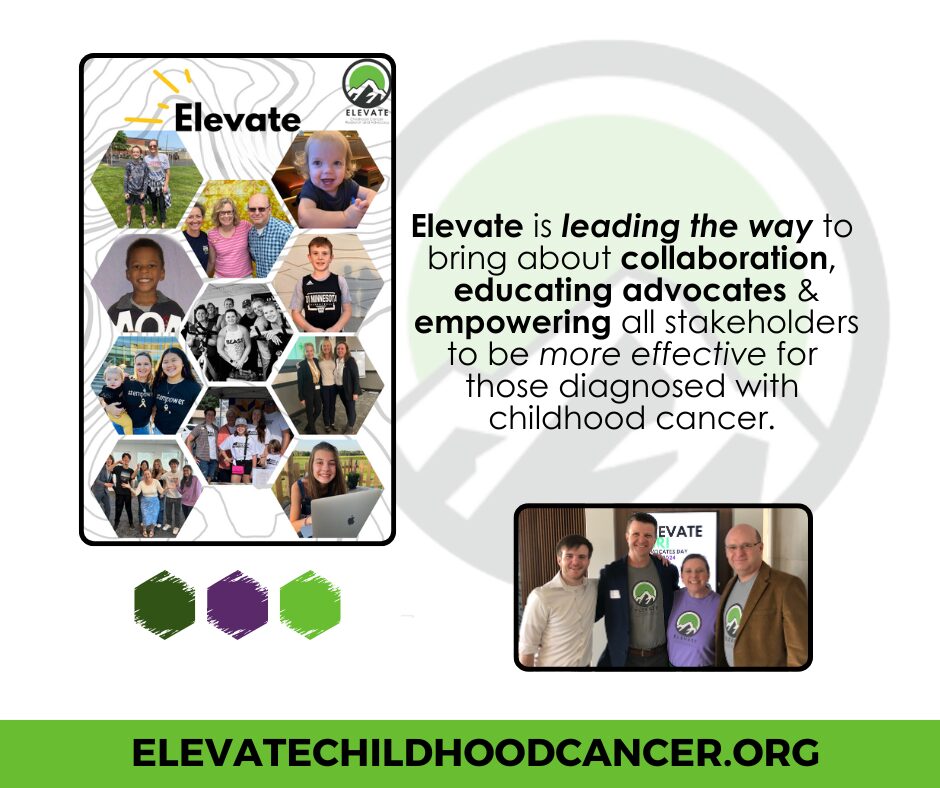
Latest Insights on Childhood Cancer from Elevate's Building Bridges Blog
ACCELERATE’s 15th Pediatric Cancer Strategy Forum
This year's focus was on antibody drug conjugates (ADCs) equipped us to be more savvy advocates for pediatric cancer research. -Robyn Spoon, PhD, Elevate Founder and CEO Elevate’s mission to save and improve the lives of those diagnosed with pediatric cancer has...
Precision Medicine for Pediatric Cancer
Our goal is for those diagnosed with pediatric cancers to be offered precision medicine from DAY ONE of their diagnosis. -Robyn Spoon, PhD, Elevate Founder and CEO I am often asked what Elevate does and the easy thing to do is rattle off Elevate’s mission: we...
Rhabdoid Tumors: Understanding Diagnosis, Treatment, and the Impact During Kidney Cancer Awareness Month
"On November 26th, 2023, I took Paislee to the emergency room, where she was admitted for high levels of calcium. Two days later, while changing Paislee's diaper, I felt a hard lump on the lower right side (her left side) of her abdomen and called for help."...
R01 Grants and Wilms Tumor Research: A Decade of Setbacks and Why These Critical Funding Gaps Matter
Here’s the heartbreaking reality: Wilms tumor, the most common abdominal childhood cancer & most common tumor affecting the kidneys, hasn’t received an R01 grant in over 10 years. Every child deserves the best chance at a future, and research is how we get there....
Pediatric Cancer Predisposition: One Family’s Shared Experience
"Ralphie’s nine-year-old sister was not identified as having a cancer predisposition syndrome until after she had been diagnosed with cancer, Wilms tumor, twice. By that time cancer filled her little body, displacing her liver, traveling throughout her abdomen,...
Ewings Sarcoma Survivor’s Mom Shares Why Blood Donations Matter
"I started donating blood when I was in high school, in a probably ill-advised scheme to work past my fear of needles." - Aimee Formo Aimee, an incredibly well-versed and passionate childhood cancer mom and advocate currently residing in Indiana, shares with...

@2023 ELEVATE Childhood Cancer Research
and Advocacy, Inc.
is a registered 501(c)(3) non-profit organization.
EIN: 93-2185372
Join us! Stay up to date with our work and mission, sign up for Elevate's newsletter!
Please help keep our site secure and solve this problem.
We respect your privacy and will never sell or share your information.
